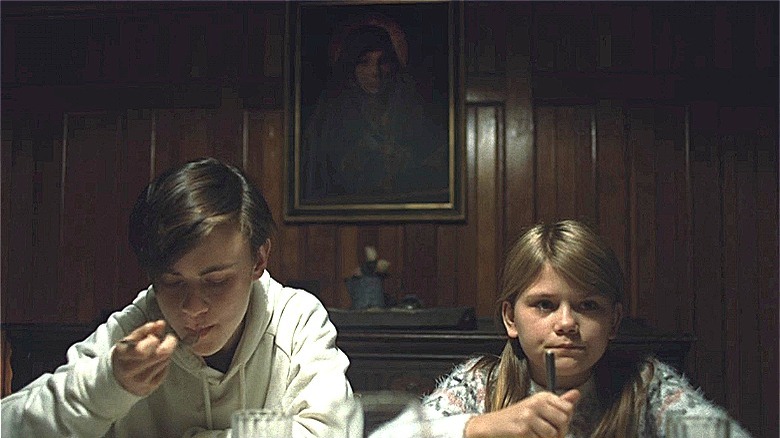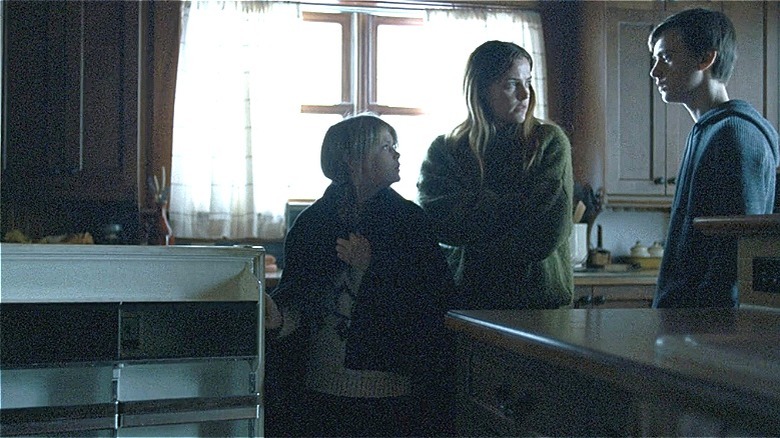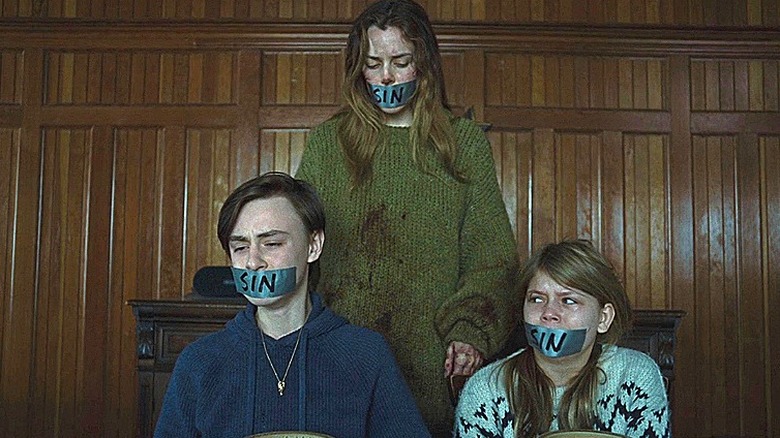The Ending Of The Lodge Explained
The follow-up to their 2014 feature "Goodnight Mommy," Veronika Franz and Severin Fiala's 2019 psychological thriller, "The Lodge" is quite the experience, to say the least. The film tells the story of soon-to-be-stepmother, Grace, who finds herself lodged in with her fiancé's estranged children during a snowstorm, only for a series of terrifying events to bring back some long-forgotten and painful memories.
Starring Riley Keough, Lia McHugh, Richard Armitage, Alicia Silverstone, and Jaeden Martell of "It" fame, the film premiered at the Sundance Film Festival back in 2019 and received largely positive reviews from critics. "The Lodge" sits at a healthy 74% critic's score on Rotten Tomatoes and 64 on Metacritic. One review by CTV News critic Richard Crouse called the film "[A] claustrophobic thriller that plays on dark psychological trauma."
"The Lodge" is certainly a movie that doesn't give away its answers easily. The film ventures into a wide array of uncomfortable and bizarre territory, but in doing so, crafts a horror experience that feels inspired, atmospheric, and lasting. The film's simple premise allows it room to expand upon its complex themes and discussions that are sure to leave any audience member thinking by the end. With that in mind, we're going to take a dive into this film's unique themes and ideas to get a better grasp of the film as a whole and how it leads to its gut-wrenching finale.
Unable to run away
Aiden (Jaeden Martell) and Mia (Lia McHugh) are devastated after their mother, Laura (Alicia Silverstone), dies from suicide. The children blame their father, Richard (Richard Armitage), for leaving their mother for a new fiancée, adding that the fiancée in question, Grace (Riley Keough), is a "psycho." Grace was once a part of a Christian cult led that had its members die by suicide to follow their leader into a "new world." Although Grace managed to escape without harm, her past nevertheless continues to follow her. Things are only complicated more when she, Richard, and the kids go to a remote lodge for the holiday season. The lodge itself is full of religious items such as crosses, while the children constantly keep reminders of their mother around, including a Mary painting and Mia's doll — which looks exactly like their mother. Although Grace tries her best to get comfortable with the kids, they constantly resent her, blaming her for their mother's death.
"The Lodge" is ultimately a story about running away from your past and what will happen when it catches up with you. This is primarily embodied by Grace, whose religious upbringings continue to be something she is trying to escape from. The children, on the other hand, stricken by grief, refuse to accept their mother's passing and do all they can to keep her spirit alive. Through this, Grace has the greatest conflict, as her own past, which involved so many of these elements, makes it hard for her to move on.
If you or anyone you know is having suicidal thoughts, please call the National Suicide Prevention Lifeline at 1-800-273-TALK (8255).
Purgatory or punishment?
Richard must leave for a bit of time to take care of some business, leaving Grace alone with the children in the lodge. Although she begins to get through to them a bit more, their relationship remains largely stagnant, especially with Aiden. One night after watching "The Thing" (which foreshadows their experience), they wake up to find out that there was a snowstorm last night, that has made it so that their power isn't working and they're stuck inside.
On top of that, their items are mysteriously missing, including Grace's medication. Grace is understandably frustrated, believing that the kids had something to do with it. But the kids are strangely calm, denying that they knew of anything about the house's items. Grace starts receiving messages to repent for her sins, only intensified when Aiden tells Grace that they are all dead and in purgatory. He proves this by hanging himself — an action which, somehow, he survives. Grace becomes increasingly distressed as the situation grows ever more confusing.
It is revealed later, however, that the kids were behind this the entire time. Turns out, they hid all the houses' belongings in a crawlspace in the basement, including Grace's pills. They've been gaslighting Grace into believing that they're in the afterlife, using Grace's religious past against her as revenge for what they believe she did to their mother. Although Grace isn't actually facing death, the kids acting out in such devious ways could very well symbolize a final challenge of faith that Grace must go up against — will she believe in outside, unknown forces or trust her own intuition?
Fulfilling her duty
By the very end, Richard returns to find Grace and the kids, with Grace now completely out of touch with reality. She proceeds to kill Richard, then go after the children. The kids have duct tape over their mouths with the word "SIN" written across them, replicating what happened to the same followers from Grace's past Christian cult. As they sing soft yet eerie prayers, we see a shot of a gun with two bullets in it, spelling out their future in a simple, yet nevertheless chilling manner.
Grace was not able to run away from her past, but has now embraced it and sees it as her destiny. Through both the constant reminders of her past and the wrongdoings put on her by the kids, Grace has lost touch with the real world and is now committed to finishing her job. The shot of the loaded gun, which is also one of the first shots of the film, bookends the movie with drastically different points of context. In the beginning, the gun is contrasted against shots of the painting of Mary, where a greater force judges the weapon and its power. The final shot leaves no barrier of the sort, placing us in that almighty position.
Just as Grace's mind must now make the choice to go through with the vile action on her own, we as an audience, are the only force that can judge who is truly worth sympathizing with in this scenario. It's a gut-wrenching ending that leaves "The Lodge" on an open-ended note, while also closing off a stellar horror experience.



